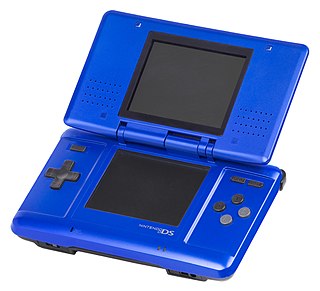
The Nintendo DS is a foldable handheld game console produced by Nintendo, released globally across 2004 and 2005. The DS, an initialism for "Developers' System" or "Dual Screen", introduced distinctive new features to handheld games: two LCD screens working in tandem, a built-in microphone and support for wireless connectivity. Both screens are encompassed within a clamshell design similar to the Game Boy Advance SP. The Nintendo DS also features the ability for multiple DS consoles to directly interact with each other over Wi-Fi within a short range without the need to connect to an existing wireless network. Alternatively, they could interact online using the now-defunct Nintendo Wi-Fi Connection service. Its main competitor was Sony's PlayStation Portable during the seventh generation of video game consoles.
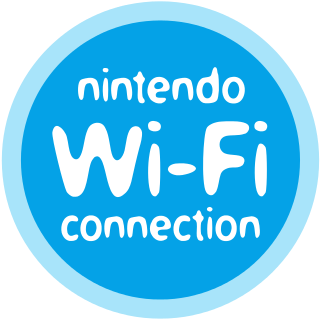
Nintendo Wi-Fi Connection (WFC) is an online multiplayer gaming service run by Nintendo to provide free online play in compatible Nintendo DS and Wii games. The service included the company's Wii Shop Channel and DSi Shop game download services. It also ran features for the Wii and Nintendo DS systems.

bit Generations is a video game franchise for the Game Boy Advance, published by Nintendo. It was first announced under the name Digitylish at the Electronic Entertainment Expo (E3) in 2005. Each of the games in the series feature simple controls, gameplay and graphics. All the games were developed by Skip Ltd., except for Digidrive, which was developed by Q-Games.
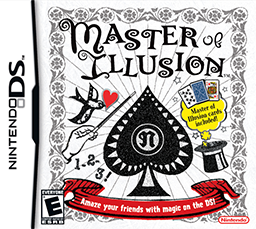
Master of Illusion, known in Europe as Magic Made Fun: Perform Tricks That Will Amaze Your Friends! and in Japan as Magic Encyclopedia, is a magician video game for the Nintendo DS. It was developed by Tenyo and Eighting and published by Nintendo, released in Japan on November 16, 2006, November 26, 2007 in North America and March 14, 2008 in Europe. Around 9 of its magic tricks were released as separate pieces of DSiWare.
WiiWare is a service that allowed Wii users to download games and applications specifically designed and developed for the Wii video game console made by Nintendo. These games and applications could only be purchased and downloaded from the Wii Shop Channel under the WiiWare section. Once the user had downloaded the game or application, it would appear in their Wii Menu or SD Card Menu as a new channel. WiiWare was a companion to the Virtual Console, which specializes in emulated games originally developed for other systems instead of original games.

The Japanese multinational consumer electronics company Nintendo has developed seven home video game consoles and multiple portable consoles for use with external media, as well as dedicated consoles and other hardware for their consoles. As of September 30, 2021, in addition to Nintendo Switch, Nintendo has sold over 863.07 million hardware units.

Tetris Party is a puzzle video game by Hudson Soft for WiiWare. An installment of the Tetris series, the game supports the use of Miis and the Wii Balance Board, and features both local and online multiplayer in addition to several single-player modes unique to the game.

The Nintendo DSi is a dual-screen handheld game console released by Nintendo. The console launched in Japan on November 1, 2008, and worldwide beginning in April 2009. It is the third iteration of the Nintendo DS, and its primary market rival was Sony's PlayStation Portable (PSP). The fourth iteration, entitled Nintendo DSi XL, is a larger model that launched in Japan on November 21, 2009, and worldwide beginning in March 2010. Development of the DSi began in late 2006, and the handheld was unveiled during an October 2008 Nintendo conference in Tokyo. Consumer demand convinced Nintendo to produce a slimmer handheld with larger screens than the DS Lite. Consequently, Nintendo removed the Game Boy Advance (GBA) cartridge slot to improve portability without sacrificing durability.

Littlest Pet Shop is a video game of the Littlest Pet Shop franchise for Microsoft Windows, Wii, and DSiWare. The game was released in North America on October 14, 2008. A second version was released on October 20, 2009, followed by a third version released on October 5, 2010.

Cubello, known in Japan as Cubeleo, was released in North America for WiiWare on October 13, 2008. While it was the third series release, Cubello was the first fully original Art Style series entry, having no bit Generations series counterpart.

Rotohex is a Nintendo video game for the Wii's WiiWare service. It is a remake of the Japan-only bit Generations title Dialhex. It was released as WiiWare in North America on October 27, 2008.

Picopict, known as Pictobits in North America and as Pictopict in Australia, is a puzzle video game developed by Skip Ltd. and published by Nintendo for the Nintendo DSi's DSiWare digital distribution service. It is one of seven games released for the DSi's Art Style series of video games. It was announced on January 26, 2009, was released two days later alongside Somnium, another Art Style game, and was released in North America and PAL regions in the same year, on May 18 and May 22 respectively. In Picopict, players use the touchscreen to move coloured blocks into a formation, such as a four-block line or a 2x2 square. This contributes to an 8-bit image, which consist of various Nintendo Entertainment System (NES) characters, such as Mario, Link, and Bowser.

Orbient, known in Japan as Orbital, is a puzzle video game developed by Skip Ltd. and published by Nintendo for the Wii's WiiWare digital distribution service. It is one of twelve games in the Art Style series of video games available for WiiWare and DSiWare. It is a remake of a Japan-only Game Boy Advance video game titled Orbital, released for the bit Generations series of video games.
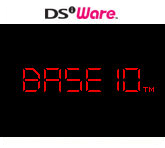
Code, known as Base 10 in North America and Decode in Japan, is a puzzle video game developed by Skip Ltd. and published by Nintendo for the Nintendo DSi's DSiWare digital distribution service.
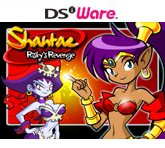
Shantae: Risky's Revenge is a platform video game developed by WayForward Technologies for the Nintendo DSi. The second installment in the Shantae series, Risky's Revenge is the sequel to the 2002 Game Boy Color video game Shantae, and follows series protagonist Shantae as she sets out to stop the ambitions of the nefarious pirate Risky Boots.

Art Academy, also known as Art Academy: Learn painting and drawing techniques with step-by-step training in the PAL regions and Artistic Taste Classroom DS in Japan, is an art training software for the Nintendo DS. It was developed by Headstrong Games and published by Nintendo. Art Academy was originally a two-part training application only available for download via the DSiWare service since 2009. It was later re-released in 2010 as a fully compiled, retail-able DS Game Card with added features, thus also making it available for original Nintendo DS and Nintendo DS Lite users.
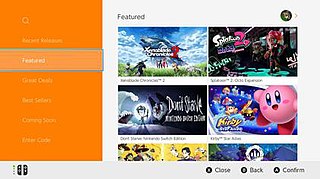
The Nintendo eShop is a digital distribution service for the Nintendo Switch, and formerly available via the Nintendo Network for the Wii U and Nintendo 3DS. The eShop was first launched in June 2011 on the Nintendo 3DS via a system update that added the functionality to the HOME Menu. It is the successor to both the Wii Shop Channel and DSi Shop. Unlike on the Nintendo 3DS, the eShop was made available on the launch date of the Wii U, although a system update is required in order to access it. It is also a multitasking application, which means it is easily accessible even when a game is already running in the background through the system software, though this feature is exclusive to the Wii U and the Nintendo Switch. The Nintendo eShop features downloadable games, demos, applications, streaming videos, consumer rating feedback, and other information on upcoming game releases.

Carmen Sandiego Adventures in Math is a series of five games released in 2011/2012 for the Wii, and is part of the Carmen Sandiego franchise. The style of the games are reminiscent of comic books. The 5-part series were the first English language console games from the Carmen Sandiego franchise since The Secret of the Stolen Drums. These "short, educational detective adventures" were only available as a download through the Nintendo Wii Shop. The games were developed by Gamelion Studios, and published by Houghton Mifflin Harcourt. They could take up to 6 players, and required 600 Wii points. Maths topics included in the games include: Symmetry, Identifying angles, Graphing coordinates on a grid, Logic puzzles, Working with fractions, Solving equations, and Tangrams. The games are designed for elementary learners across grades 3–5.

Mario vs. Donkey Kong is a crossover spin-off video game series of both the Mario and Donkey Kong franchises, based on puzzle platforming, marking the return of Pauline and the rivalry between Mario and Donkey Kong.

















